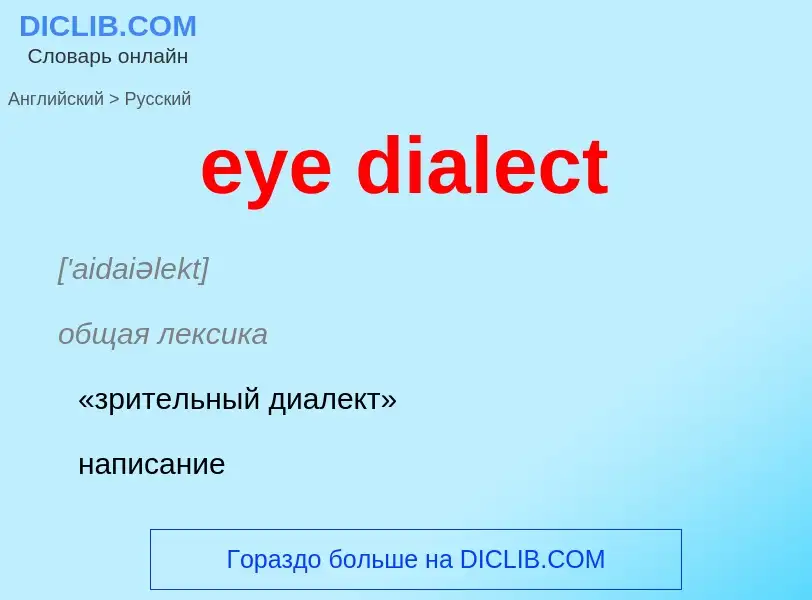Übersetzung und Analyse von Wörtern durch künstliche Intelligenz ChatGPT
Auf dieser Seite erhalten Sie eine detaillierte Analyse eines Wortes oder einer Phrase mithilfe der besten heute verfügbaren Technologie der künstlichen Intelligenz:
- wie das Wort verwendet wird
- Häufigkeit der Nutzung
- es wird häufiger in mündlicher oder schriftlicher Rede verwendet
- Wortübersetzungsoptionen
- Anwendungsbeispiele (mehrere Phrasen mit Übersetzung)
- Etymologie
eye dialect - Übersetzung nach russisch
['aidaiəlekt]
общая лексика
«зрительный диалект»
написание
имитирующее диалектное или просторечное произношение (sorta вместо sort of
feller вместо fellow и т. п.)
['aiwɔ:l]
метеорология
облачный вихрь вокруг ядра тайфуна
"глаз бури"
существительное
метеорология
облачный вихрь вокруг ядра тайфуна
«глаз бури»
общая лексика
невооружённый глаз
невооруженный глаз
Definition
Wikipedia
Eye dialect is the use of deliberately nonstandard spelling for standard pronunciation. The term was coined by George Philip Krapp to refer to a literary technique that implies the standard pronunciation of a given word that is not well-reflected by its standard spelling, such as wimmin to more accurately represent the typical English pronunciation of women. However, eye dialect is also commonly used to indicate that a character's speech is vernacular (nonstandard), foreign, or uneducated. This form of nonstandard spelling differs from others in that a difference in spelling does not indicate a difference in pronunciation of a word. That is, it is dialect to the eye, rather than to the ear.


![The eye of [[Hurricane Katrina]] viewed from a [[hurricane hunter]] aircraft The eye of [[Hurricane Katrina]] viewed from a [[hurricane hunter]] aircraft](https://commons.wikimedia.org/wiki/Special:FilePath/Fly00449 - Flickr - NOAA Photo Library.jpg?width=200)
![[[Hurricane Wilma]] with a pinhole eye [[Hurricane Wilma]] with a pinhole eye](https://commons.wikimedia.org/wiki/Special:FilePath/HurricaneWilma20Oct2005.jpg?width=200)
![Detailed view of hurricane Isabel's eye, as viewed from the [[International Space Station]] Detailed view of hurricane Isabel's eye, as viewed from the [[International Space Station]]](https://commons.wikimedia.org/wiki/Special:FilePath/Hurricane Isabel eye from ISS (edit 1).jpg?width=200)
![Hurricane Emilia]] in 1994. Hurricane Emilia]] in 1994.](https://commons.wikimedia.org/wiki/Special:FilePath/Hurricane emilia (1994) eye close-up.jpg?width=200)
![Typhoon Maysak's]] eye from the [[International Space Station]] on March 31, 2015, displaying a pronounced stadium effect. Typhoon Maysak's]] eye from the [[International Space Station]] on March 31, 2015, displaying a pronounced stadium effect.](https://commons.wikimedia.org/wiki/Special:FilePath/Maysak seen from the ISS 3.jpg?width=200)


![A photographic approximation of a naked eye view of the [[night sky]] from a small rural town (top) and a [[metropolitan area]] (bottom). [[Light pollution]] dramatically reduces the visibility of [[star]]s. A photographic approximation of a naked eye view of the [[night sky]] from a small rural town (top) and a [[metropolitan area]] (bottom). [[Light pollution]] dramatically reduces the visibility of [[star]]s.](https://commons.wikimedia.org/wiki/Special:FilePath/Light pollution country versus city.png?width=200)
.jpg?width=200)
